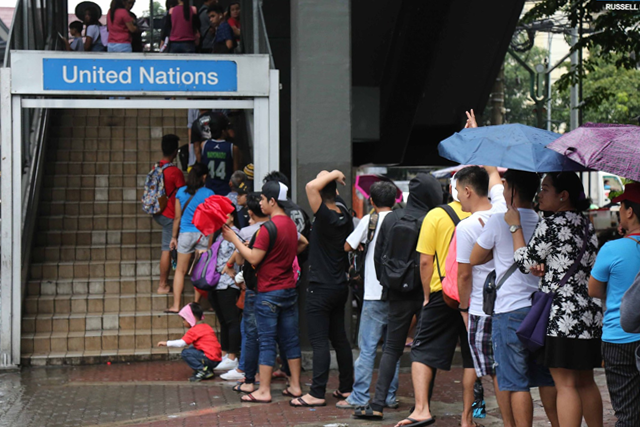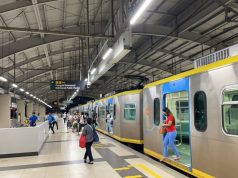Posts of long lines of commuters waiting at MRT and LRT stations made rounds on social media amid worsening traffic in Metro Manila.
Filipinos who use public transportation aired their frustrations on their travel conditions during this rainy season.
Commuter Jay Lopez shared that the Filipino workforce spent more time traveling outside than being with their loved ones or working. He also attached photos of the long lines at some MRT stations.
This may not bother most of you but for those that do use mass public transportation you may be able to relate. I take…
Posted by Jay Lopez on Thursday, August 1, 2019
“Something must be done about this. Really. Poor mass public transportation and insane levels of traffic rob the commuting of 4-6 hours of their lives, which they could use more productively, just trying to get to and from work,” Lopez said.
He also lamented the fact that commuters don’t have much choice on the means of transportation for their daily grind.
Traveling via a private car or a city bus will make you face the “horrendous traffic,” Lopez pointed out, adding that opting for the trains will either get you stuck in a long line or stranded inside the train car due to breakdowns.
He also said that biking to work is possible, but current road conditions make this a risky option. Moving near the place of work, meanwhile, is expensive.
He then brought up the work-from-home or telecommuting scheme given the accessibility of the internet nowadays.
A photo from Twitter user @aadeguzman showing a long and thick volume of people at North Avenue Station also circulated on the micro-blogging platform. According to the time stamp, it was taken on August 1 at 8:10 am.
North Ave as of 8:10am pic.twitter.com/4fXwE9CJDk
— Aaron De Guzman (@aadeguzman) August 1, 2019
This was a reply to an update that day from the MRT-3’s Twitter account, which Filipinos perceived to be not made in real time.
Despite these criticisms, the Metro Manila Development Authority or MMDA pushed through with the dry run of the provincial bus ban on August 7.
This policy prohibits provincial buses from plying along EDSA despite them occupying only 1% of the total vehicles passing through the highway.
MMDA traffic chief Bong Nebrija said that only a few operators so far have participated.
“Hindi po sila (operators) nag-participate as agreed upon. Anyway, I will just give the report to our GM (general manager) na ganyan po ang nangyari. Maybe later on he will decide whether to cancel it or not,” Nebrija said.
The yellow lane policy, which restricts city buses to the yellow lane, is also still being strictly implemented even if it causes heavier traffic congestion than before.
Solutions at hand
In his State of the Nation Address last July 22, President Rodrigo Duterte said the country loses an estimated P3.5 billion a day due to traffic congestion.
He then directed the MMDA and other local officials to find solutions.
This, however, did not directly concern the welfare of commuters who bear the brunt of the inefficient transport system.
Magna Carta for Commuters
Two lawmakers, in collaboration with a transport advocacy group AltMobility, filed legislative measures that address the needs of commuters.
Rep. Allan Benedict Reyes of the 3rd district of Quezon City filed House Bill No. 3125 titled “An Act Creating a Magna Carta of Commuters” at the lower chamber.
Prior to this, Sen. Frnacis Pnagilinan filed Senate Bill 775 or “An Act Providing for a Magna Carta for Dignified Commuting, Creating the National Office of Commuter Affairs” at the Senate.
MRT/LRT Rehabilitation
Light Rail Transit 1 (LRT1) operator Light Rail Manila Corporation (LRMC) tweeted last June some changes on the schedule of its trains to accommodate improvements of its services to the public. This new schedule took effect last July 29.
“The system upgrade and rehabilitation work will include the replacement of the auxiliary power supply and train control and monitoring system among many others,” LRMC operations director Bobby San said.
Last May, the overall rehabilitation and maintenance of MRT-3 was handed over to the group of Sumitomo-Mitsubishi Heavy Industries-TES Philippines.
The rehabilitation works are expected to be finished within two years of the 43-month contract signed in December of last year.










